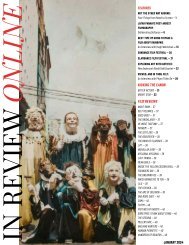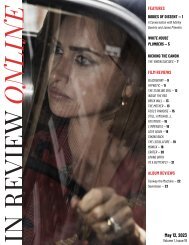You also want an ePaper? Increase the reach of your titles
YUMPU automatically turns print PDFs into web optimized ePapers that Google loves.
FESTIVAL COVERAGE<br />
of school, and spends the summer fencing stolen bikes with his<br />
slightly better-off friend Dono (Donovan Nizet). Although<br />
Sermon-Daï never spells it out, Mak’s anger issues may owe as<br />
much to anxiety about his sexual identity as they do to his<br />
mother’s indifference.<br />
Although It’s Raining in the House appears, stylistically, indebted<br />
to the Dardennes, Sermon-Daï’s approach is very different.<br />
Where the Belgian brothers’ narratives tend to be rather<br />
propulsive, It’s Raining in the House is languid, at times even a bit<br />
inert. The essentials of its story will call to mind other, better<br />
films, such as Hirokazu Kore-eda’s Nobody Knows or, perhaps<br />
more closely, Ursula Meier’s Sister. But where those films<br />
seemed intent on dramatizing their young characters’ plights as<br />
signs of egregious neglect, Sermon-Daï merely observes, as if to<br />
suggest that there’s nothing that surprising about kids left to<br />
fend for themselves. And sadly, that may be true. <strong>—</strong> MICHAEL<br />
SICINSKI<br />
A SONG SUNG BLUE<br />
Geng Zihan<br />
A delicate and bittersweet queer coming-of-age film, A Song<br />
Sung Blue is also, unfortunately, weighed down by all the<br />
predictable beats that befall its bildungsroman genre. Set in the<br />
early 2010s in Harbin, China, Geng Zihan’s debut feature follows<br />
fifteen-year-old Liu Xian (Zhou Meijun), who’s sent off to live with<br />
her estranged father<br />
after her mother<br />
takes a job in Africa.<br />
Xian is a child whose<br />
presence is a mere<br />
afterthought to her<br />
parents; in turn, she<br />
shrinks down within<br />
every space she<br />
occupies, reducing<br />
herself to silently<br />
watching the world<br />
from behind window<br />
sills as it moves on<br />
without her. Xian’s<br />
father is a<br />
photographer, and his studio is where Xian is forced to spend<br />
most of her time. It’s at the studio that Xian meets Mingmei<br />
(Huang Ziqi), the bold and assertive 18-year-old daughter of the<br />
receptionist with whom Xian’s father is having an affair.<br />
The photography studio offers an appropriate setting to highlight<br />
Xian’s growing (and largely unrequited) infatuation with Mingmei.<br />
Upon arriving at the studio, we’re introduced to Xian <strong>—</strong> who<br />
barely spares a glance for her father <strong>—</strong> gazing longingly at<br />
professional portraits of women. In these photographs, the<br />
women appear cheerful; they’re donned in garish colors that<br />
outshine Xian’s drab uniform (and stand out against this film’s<br />
predominantly melancholic blue palette). Yet every photograph<br />
also suggests the alluring pretense of appearances: Xian longs to<br />
be recognized by her parents, and this desire leads her to fall for<br />
a woman whose interest in Xian is as dead as the frozen frames<br />
plastered all over the studio. Not surprisingly, Mingmei also<br />
poses for portraits from time to time, thus bringing the cruel<br />
filmic metaphor of a lonely and unrequited love to fruition.<br />
While cinematographer Hao Jiayue creates a hazy and dreamlike<br />
atmosphere through which to explore Xian and Mingmei’s<br />
encounters, perfectly accentuating the fantastical and<br />
all-consuming nature of Xian’s one-sided obsession with the<br />
older Mingmei, at times Geng’s film seems to rely too heavily on<br />
style to buoy a stagnant narrative of desire. The wistfulness<br />
pervading every frame mirrors Xian’s passivity and self-defined<br />
10
















